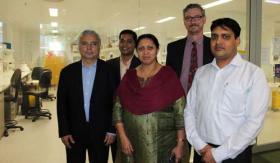Australia-India collaboration forges partnership

The desire to develop new classes of chemotherapeutic drugs led Dr Shane Thomas to form an exciting collaboration with leading Indian researcher Professor Govindasamy Mugesh from the Indian Institute of Science. The collaboration also inspired a recent visit to UNSW’s Lowy Cancer Research Centre by an Indian delegation from the Indian Ministry of Science and University of Delhi.
The partnership began in 2010 when Dr Thomas - from the Centre for Vascular Research and School of Medical Sciences - was working on a project that focused on the roles and regulation of Indoleamine 2, 3-dioxygenase (IDO) – a protein expressed by cancer cells.
“Cancer cells can express IDO that protects them from the patient’s immune system. Our project aimed at developing new classes of drugs that potently inhibited this protein and tested their anti-cancer activity,” he said.
Dr Thomas’s laboratory discovered that a class of drugs called Selenazoles represented one of the most potent classes of IDO inhibitors reported to date – a drug class that Professor Mugesh is an expert in. Dr Thomas said the collaboration was a genuine partnership from the start with Dr Mugesh designing and synthesising the drugs in India, then sending them to Dr Thomas who performed biochemical and cellular studies to test the different classes of selenazole drugs as inhibitors of IDO activity. With the collaboration of Professor Philip Hogg from the Lowy Cancer Research Centre, testing of the selenazole drugs as anti-cancer agents has also commenced.
While to date the anti-cancer action of selenazoles is yet to be established, Dr Thomas and Professor Mugesh aim to continue to work together and forge further partnerships between their two countries. Professor Hogg said: “This Australian-Indian partnership marries first-rate biology with first-rate chemistry. This cross-nation and cross-disciplinary collaboration will achieve outcomes that would not be possible if Dr Thomas and A/Prof Mugesh were working separately.”
As a result of this partnership, a recent Indian delegation visited UNSW Medicine. The delegation led by Dr Renu Swarup included representatives from the Ministry of Science and Technology and University of Delhi.
Back to top
Archive
- February
- March
- April
- May
- June
- July
- August
- September
- The complex lives of glia after...
- Randwick Precinct Initiating Early...
- Randwick Precinct Cancer Genomics...
- What are the mechanisms behind...
- Congratulations to new Associate...
- Medicine Learning L&T Forum
- Revolution in Breast Cancer -...
- The Split Personality of Glutamate...
- Lowy Cancer Research Centre...
- Cancer Metabolism roundtable
- Single Cell Epigenomics for...
- October
- November
